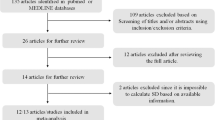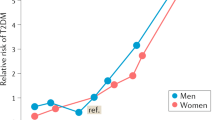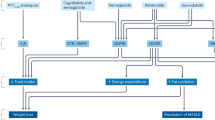Abstract
Today, obesity is the most important modifiable risk factor for type 2 diabetes. An excess of body fat is associated with a deterioration of glucose utilisation and promotes the development of type 2 diabetes, particularly in those with a genetic predisposition for the disease. It is also well established that a reduction of excess body fat improves insulin sensitivity and can prevent the conversion to diabetes. In those with overt diabetes, weight loss usually ameliorates glycaemic control and associated metabolic disturbances. Among the pharmacological agents that are used for the treatment of type 2 diabetes only metformin has a weak weight-lowering activity and is considered as the drug of choice for adjunct pharmacotherapy in obese diabetic subjects. A few studies also suggest that acarbose can induce a modest weight reduction in such patients. In contrast, sulphonylurea and insulin treatment is frequently accompanied by substantial weight gain which should be taken into consideration when these drugs are used. Another approach to improve metabolic control in obese type 2 diabetic patients is the use of weight-lowering agents. The new serotonin and noradrenaline reuptake inhibitor sibutramine promotes weight loss which subsequently leads to improved glycaemic control. Orlistat, a lipase inhibitor, is also able to ameliorate metabolic control in such patients due to its weight-lowering potential. As obesity remains a therapeutic challenge in most type 2 diabetic subjects, weight management drugs may represent an alternative or supplement to antidiabetic agents. Moreover, weight management agents have the advantage that they have additional favourable effects on associated cardiovascular risk factors.
This is a preview of subscription content, access via your institution
Access options
Subscribe to this journal
Receive 12 print issues and online access
$259.00 per year
only $21.58 per issue
Buy this article
- Purchase on Springer Link
- Instant access to full article PDF
Prices may be subject to local taxes which are calculated during checkout
Similar content being viewed by others
Author information
Authors and Affiliations
Corresponding author
Rights and permissions
About this article
Cite this article
Hauner, H. The impact of pharmacotherapy on weight management in type 2 diabetes. Int J Obes 23 (Suppl 7), S12–S17 (1999). https://doi.org/10.1038/sj.ijo.0800956
Published:
Issue Date:
DOI: https://doi.org/10.1038/sj.ijo.0800956
Keywords
This article is cited by
-
Loss of BIM increases mitochondrial oxygen consumption and lipid oxidation, reduces adiposity and improves insulin sensitivity in mice
Cell Death & Differentiation (2018)
-
Obesity: Prevalence, Theories, Medical Consequences, Management, and Research Directions
Journal of the International Society of Sports Nutrition (2005)
-
Is a Calorie Really a Calorie? Metabolic Advantage of Low-Carbohydrate Diets
Journal of the International Society of Sports Nutrition (2004)
-
The Obesity Pandemic: Where Have We Been and Where Are We Going?
Obesity Research (2004)



